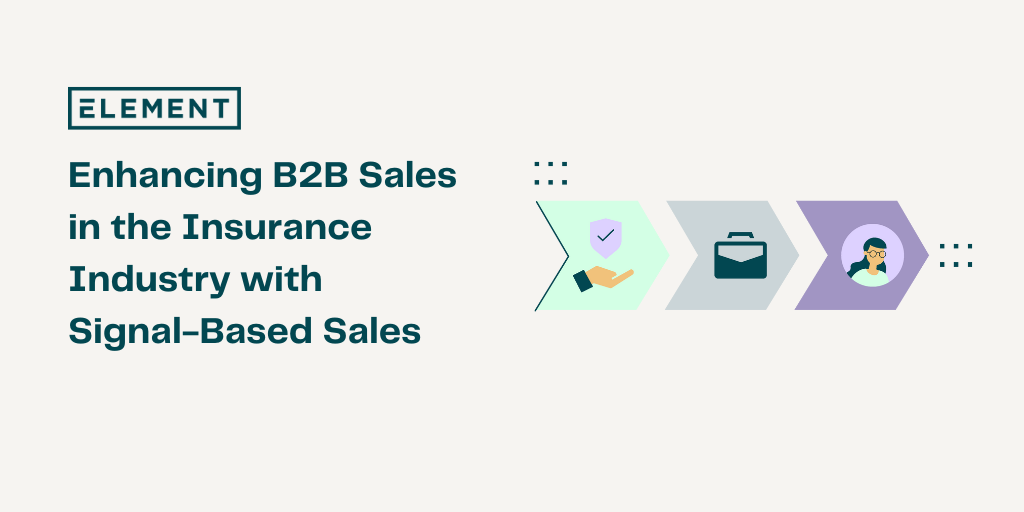
Enhancing B2B Sales in the Insurance Industry with Signal-Based Sales
For those of us that are regularly on LinkedIn and similar platforms, the concept of signal-based sales might likely sound familiar. This sales “strategy” has emerged as an indispensable tool in modern B2B sales, offering an innovative approach to boosting sales success and fostering long-term customer relationships.
What is Signal-Based Sales?
Signal-based sales, also known as trigger-based selling, is a modern sales approach that responds to specific signals or triggers indicating potential customer interest. These signals can originate from various sources, such as social media comments, press releases, company registrations, website activities, whitepaper downloads, newsletter sign-ups, or webinar participation. The key is to identify and analyze these signals to initiate targeted and personalized sales activities.
Advantages of Signal-Based Sales over Traditional Outbound Sales
Signal-based sales offer several benefits compared to traditional outbound sales, making it a highly effective and efficient sales tool:
- Higher Relevance and Personalization: Signal-based sales enables targeted and personalized outreach based on the specific interests and behaviors of potential customers. In contrast, traditional outbound sales often relies on generic messages and general sales pitches that may be less relevant to the recipients.
- Better Timing: By utilizing real-time signals, sales representatives can approach potential customers when their interest is likely at its peak. Traditional outbound sales often contacts potential customers unprepared/outside of their current demand, leading to lower success rates and increased frustration.
Expected Outcomes
- Increased Efficiency: Signal-based sales helps utilize resources more efficiently by focusing efforts on the most promising leads at the right moments. This reduces the effort and costs compared to classic outbound sales, which often involves contacting large numbers of potential customers without preselection.
- Higher Success Rate: Since signal-based sales are based on concrete interests and behavioral signals, the likelihood of a successful conversion is higher. Traditional outbound sales typically has lower conversion rates due to a less targeted outreach.
- Better Customer Experience: Personalized and relevant outreach makes potential customers feel better understood and valued, laying the foundation for long-term business relationships. This leads to a more positive customer experience and can enhance brand perception.
Prerequisites for Signal-Based Sales
- Data-Driven Decisions: Signal-based sales relies on data-driven insights to make informed decisions. This requires a timely data collection and accurate data analysis.
- Differentiating Right from Wrong Signals: Understanding the target audience is crucial to differentiate between genuine interest signals and misleading indicators. Genuine signals include specific actions or behaviors indicating real interest or intent to purchase, such as requesting a product demo or repeatedly visiting a product page.
Challenges
- Suitable Tools: Selecting and implementing appropriate tools for signal-based sales can be complex, as these systems must integrate various data sources and perform precise analyses (and potentially various tools itself). Off-the-shelf solutions may not always be applicable, especially in the context of core insurance systems.
- Access to Signals: Accessing relevant signals requires comprehensive data collection from various channels, which can be technically challenging. Companies must process this data in real-time to respond promptly to potential customer needs.
- Compliance with Data Protection: Compliance with data protection regulations is crucial, as collecting and using customer signals involves sensitive data. Companies must implement strict data protection policies and processes to comply with legal requirements such as GDPR and maintain customer trust.
ELEMENT’s Experience
At ELEMENT, efficient sales are vital due to our small sales team, which we must deploy strategically. Signal-based sales is particularly relevant for us, especially in sales to Managing General Agents (MGAs) and underwriters. However, the MGA market is small and trust-based, with few public signals. Therefore, we often rely on other promising approaches, such as using multipliers or a targeted direct outreach.
By adopting a signal-based sales approach, companies can leverage the latest technologies and data sources to reach potential customers with the right message at the right time, leading to higher success rates and better resource utilization, ultimately making it a superior strategy compared to traditional outbound sales.
However, the choice of sales strategies and tools depends on the business model, target audience, and specific implementation feasibility.

